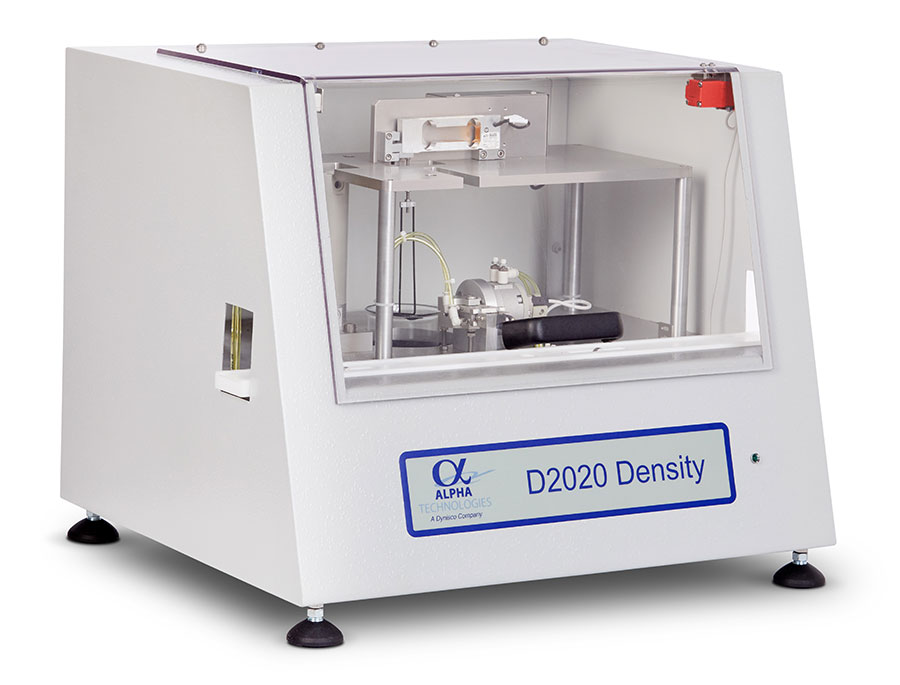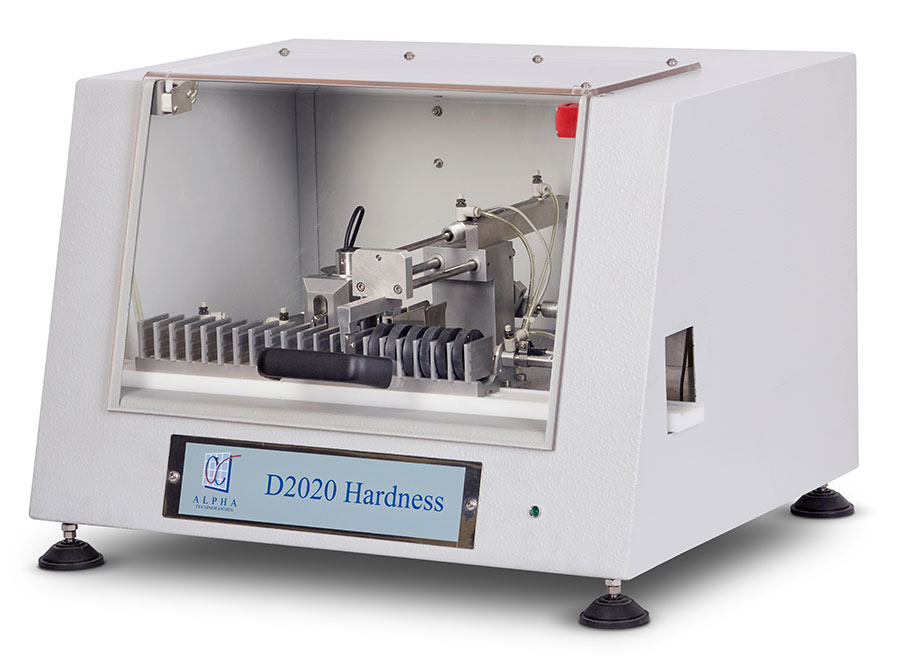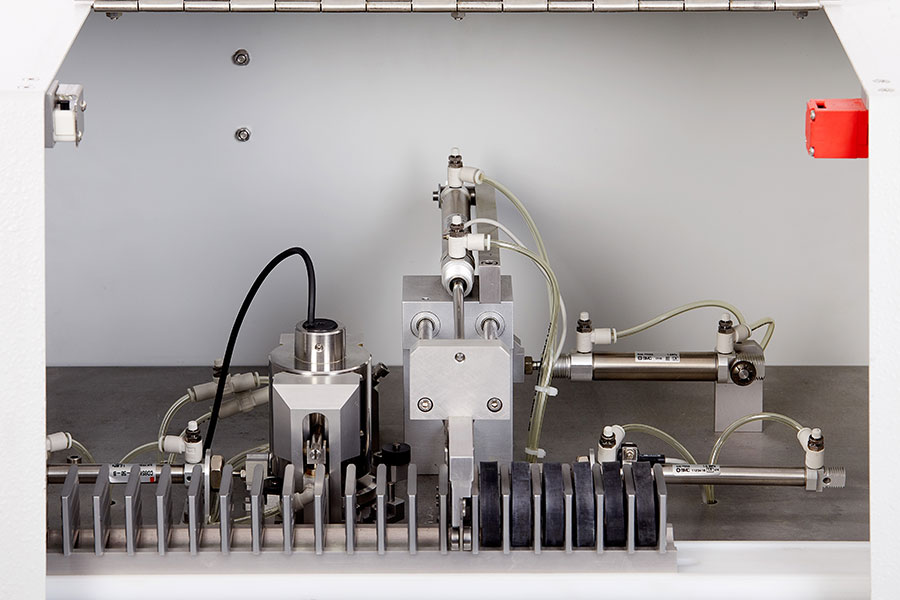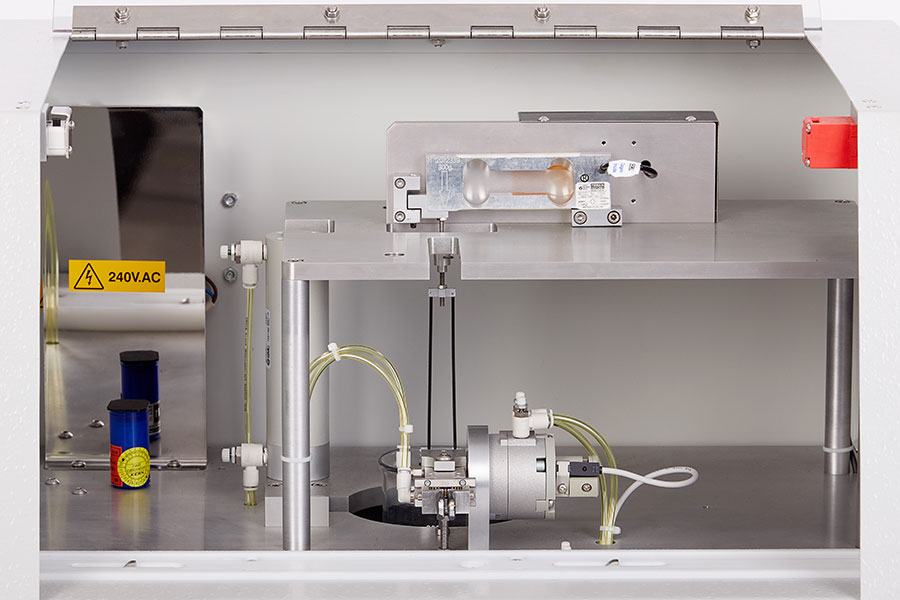What is The Current State of Tensile Testing? Tensile testing...
Read MoreD2020 Series
- Home
- instruments
- Physical Properties
- D2020 Series
Fully automated testing for material density and hardness.
Alpha’s D2020 instruments provide fully automated testing for up to 20 samples. They provide simple, but precise solutions to determining the suitability of a material for your application. Most competitors automate their single test operation, but require an operator to load the sample, run the test, remove the sample, repeat. In contrast, Alpha’s D2020 automated 20-sample cassette helps ensure repeatability while freeing the operator for other tasks in the lab.

D2020 Density
Eureka! Alpha’s D2020 Density instrument is based on the Archimedes’ principle where the upward buoyant force that is exerted on a test sample immersed in water is equal to the weight of the water that the sample displaces and acts in the upward direction.
D2020 Density utilizes the compound’s weight in air and in water to account for any environmental differences during testing, resulting in higher quality standards and increased precision.
Fully automated operation helps ensure repeatability while freeing the operator for other tasks in the lab. Additionally, rapid readings help reduce water absorption which translates into a more accurate reading. For even greater precision the specific gravity of the liquid is automatically corrected for temperature.
D2020 Hardness
Alpha’s Shore A and IRHD instruments are based on the test methods developed by Albert F. Shore in the 1920s to measure the hardness of materials. This method is the measure of how resistant a given material is to permanent indentation – that is, the measure of the depth of indentation created on the material with a specific force. Both versions provide highly repeatable measurements on rubber and polymer parts.
The International Rubber Hardness Degree (IRHD) – as defined in ISO 48 – is a fully automated measuring procedure preferred in Europe. The IRHD hardness value is read directly from the internal lookup table in Alpha’s Enterprise software.
The Shore A method – defined under ASTM D2240 – allows for a measurement of the initial hardness, or the indentation hardness after a given period of time.
In addition to its 20-sample automation cassette, D2020 Hardness instruments can be automatically rotated, allowing multiple readings per test sample.


Best-in-class Instruments deserve world-class software.
D2020 Instruments operate using Alpha’s proprietary Enterprise software suite, including Pathfinder Workbench and Labjack software, to connect density and hardness tests to your LIMS. Once the data is created the Enterprise software organizes data into reports and can perform analysis that allows the user to statistically control their manufacturing process.

Specifications
| Testing Standards: | ASTM D297 Section 16.3 and ISO 2781 |
| Specific Gravity Range: | 1.05 to 2.00 |
| Accuracy: | Better Than ±0.5% |
| Standard Deviation: | (SG 1.05 to 1.4) 0.0015 |
| Standard Deviation: | (SG 1.4 to 2.0) 0.0030 |
| Automation Samples: | 20 |
| Sample Diameter: | 35 to 45 mm |
| Sample Thickness: | 4 to 10 mm |
| Maximum Sample: | Weight 18 g |
| Weight: | 75 lb (34 kg) |
| Dimensions: | 23″ (584mm) W x 20″ (508mm) D x 20″ (508mm) H |
| Testing Standards: | ASTM 1415, BS 903, DIN 53519, ISO 48, NF T46-003 for IRHDASTM D2240, BS 2782, BS 903, DIN 53505, ISO 7619, ISO 868, NF T46-052 for Shore A |
| Indenter: | IRHD: Spherical Ball-2.5 mm Diameter, Shore A: Truncated Cone-0.79 mm Diameter |
| Hardness Range: | IRHD: 30 to 100;
Shore A: 10 to 90 |
| Accuracy: | <0.5 |
| Test Time: | 1 to 99 sec |
| Automation Samples: | 20 |
| Sample Diameter: | 35 to 45 mm |
| Sample Thickness: | 4 to 10 mm |
| Weight: | 75 lb (34 kg) |
| Dimensions: | 23″ (584mm) W x 20″ (508mm) D x 20″ (508mm) H |
Related Links
What is the Difference Between ASTM Standards & ISO Standards?
Many key industries and supply chains rely on ASTM and...
Read More







